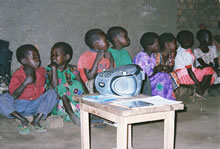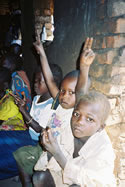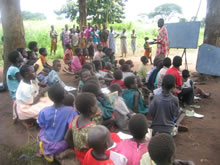Teaching Literacy and Math in remote regions of Sudan
April 2006

Boys and girls in Maridi, Sudan participate in a formative evaluation SSIRI class in a tukul.
In some parts of Southern Sudan, school consists of one teacher, 50 students, and the shade provided by some trees. In others, children gather for school in a small hut, or “tukul,” made from mud bricks and thatch, with no electricity or running water. Teachers might have chalk and a chalkboard, but books, paper, and pencils are rare.
This is the legacy of civil war and poverty that have decimated all sectors of public life in Southern Sudan. As the region works its way toward peace and reconstruction, the Ministry of Education, Science and Technology and USAID have turned to the task of building the region’s first viable education system.
"There are children everywhere who have never had the opportunity to go to school,” says Leesa Kaplan-Nunes. “They are very eager to go.”
Kaplan-Nunes and a team of Sudanese educators are working with USAID and the Ministry of Education to bring interactive radio lessons and teacher training to classrooms across the region. Known as Southern Sudan Interactive Radio Instruction (SSIRI), the program teaches English literacy, native language literacy, and mathematics for primary grades 1-3. SSIRI is just one part of a national education initiative that includes everything from building schools to training teachers.
The IRI lessons are dynamic, employing a combination of games, songs, and stories to introduce quality educational content and sound pedagogical practice. “Our audience is the whole classroom,” says Kaplan-Nunes. “The program functions like another teacher in the room. It has the dual goal of instructing the teacher on how to do a better job, while also leading the children in exercises that support active learning, reinforce key concepts, and make learning fun.”
This approach is different from anything students and teachers have done before in Southern Sudan, where traditional teaching methods rely heavily on recitation and memorization. In the IRI programs, a radio teacher named “Madame Rhoda” instructs the classroom teacher to invite participation by having students answer questions aloud and write on the chalkboard or in the dirt. A cast of five additional characters leads other exercises where students sing songs and respond out loud. The broadcasts also instruct teachers to include girls and boys in the activities equally, a significant departure from traditional classroom practice.

Students use their fingers to count as they sing along with the song in the SSIRI Primary One program.
“We encourage teachers to use whatever is at hand,” explains Kaplan-Nunes. “There are counting songs that instruct children to use sticks, stones, their fingers, or their bodies. The lesson on colors directs teachers to point to the grass for green, point to the sky for blue.”
The programs are explicitly designed to provide training for the teachers as they lead the children in these new learning methods. Fewer than 10 percent of the teachers in the region have any formal training at all, and most receive no pay for the work they do. “We find that the teachers are very appreciative of the help and guidance they receive from the radio programs,” says Kaplan-Nunes.
Based in Nairobi, Kenya, SSIRI employs a team of 18 Southern Sudanese educators, scriptwriters, actors, and production staff to develop 100 half-hour programs for each grade level. “Our staff members are mostly Sudanese men and women hired locally in Sudan or Nairobi,” says Kaplan-Nunes. “Many are refugees of the diaspora.”
As they develop the lessons, the production team works closely on formative evaluation with refugee children and teachers at the Sudan Academy in Nairobi, as well as a number of schools in Southern Sudan. After writing and recording the script, staff members take it into classrooms where a team of observers watches how the children and teachers react. “We look for whether the pacing is right or the vocabulary needs tweaking,” says Kaplan-Nunes. “We spend a lot of time on formative evaluation in order to gauge the enthusiasm of the students and teachers for the lessons. So far the response is very positive,” she says.
The programs began broadcasting daily across the region this winter on Sudan Radio Service. Any school with a radio can receive and use the lessons, but the project has targeted 200 schools in eight counties to follow closely. The project provided these schools with solar-powered and wind-up radios and teachers guides. In addition, the project has trained a cadre of outreach coordinators for each region who in turn train teachers on how best to use and care for the radios and to integrate the programs into the school day. The project has also developed basic monitoring and evaluation tools to track the impact of the programs, such as attendance sheets and pre- and post-tests for students.

Students gather under some trees for their SSIRI lessons. Others in the community look on.
In addition to the classroom-based lessons, SSIRI is developing programming for Southern Sudan’s Accelerated Learning Program, which targets adolescents and adults who have not been able to attend school in the past. The program will deliver the lessons for grades one and two in a single combined year. SSIRI is also training 20 teachers in how best to use the instruction with this older audience.
"We are reaching very remote areas where there are no school buildings,
desks, or opportunities for teacher training,” says Kaplan-Nunes.
“We are very excited to be able to bring these teachers interactive,
up-to-date materials.”
For more information, please contact:
- EDC Project Director (IES), Kent Noel, knoel@edc.org
- EDC Chief of Party, Leesa Kaplan-Nunes, lkaplan-nunes@edc.org
- EDC Project Coordinator (IES), Abdenour Boukamhi, aboukamhi@edc.org
